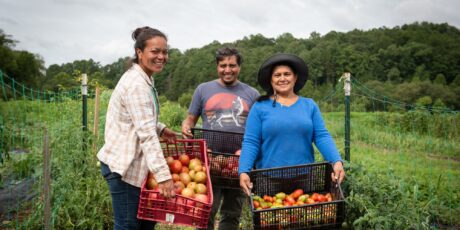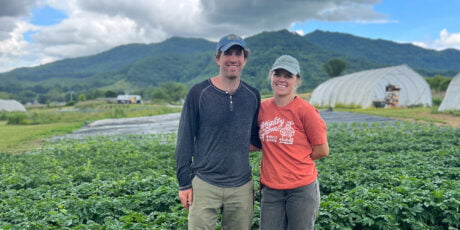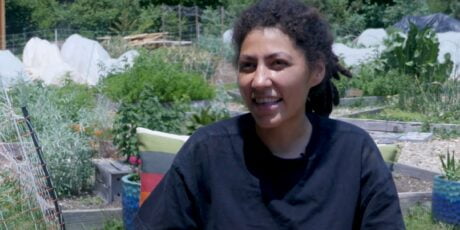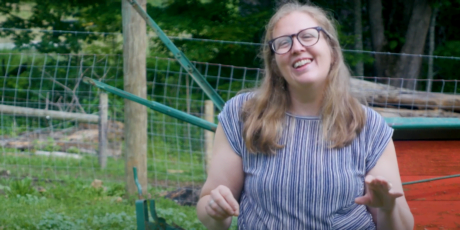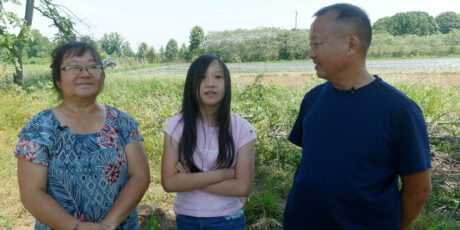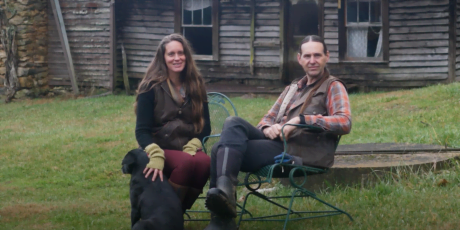Tierra Fértil Coop is an Hispanic, worker-owned farm cooperative in Hendersonville, North Carolina. Members Delia and Maria talk about how this project stemmed from personal and collective dreams of promoting access to resources and the capacity to produce food and stimulate food justice and racial equity in the local food and agricultural system.
The video is in Spanish with a translated transcript below.
Delia: It means that we are a land that regardless of where it is is capable of producing many things and to generate benefits and advantages. So I think that our communities are fertile communities, they are communities that produce a lot, that work a lot and that are capable of change.
Maria: My name is Maria. I am originally from El Salvador. My mother was a single mother, with 11 children, in the countryside.
Delia: Cooperativa Tierra Fértil was born—well, this is something that we talked about among the members at the time. One of the things that came up is that for us, we immigrants are fertile ground. So I think that our communities are fertile communities. They’re communities that produce a lot, that work a lot, and that are capable of change. And in my 44 years, I understood that one of my purposes was to reconnect with the earth, to reconnect with something that is essential in our lives, as Hispanics, as indigenous people, as immigrants.
No, no, I didn’t want to be a farmer! Because sadly in our countries being a farmer, being a peasant was always a disadvantage. But I understood that success is late, that success has nothing to do with money, nor with belongings, nor with things, but it has to do with whatever generates you peace, with whatever brings you well-being, with what generates you joy.
You can’t stop planting corn if you are Hispanic, that is to say, that is a determining factor, because corn, besides being essential in our cooking, in our food, it is also essential in our roots. Corn represents my childhood, my history, my family, my community. But a great lesson we learned this year is that you have to protect the corn, in the sense that we do not cultivate with pesticides or with any kind of fertilizer. Therefore, corn is more vulnerable mainly with the birds, which is what happened to us. We planted corn twice and both times the corn was eaten by crows. Generally from August to October you can have corn so that you can eat it fresh or eat it dry.
The Hispanic community is growing not only in size, but also in diversity. That is, we come from different backgrounds. I’m talking about Guatemala, Honduras, El Salvador, Nicaragua. Many people from Colombia, Venezuela. So I see a community with a huge potential, but with very few opportunities for development and with tremendous barriers that are associated to your academic your academic level, your immigration status.
The role of our farm is just to do a little bit to transform the way the community looks at us. How the Hispanic community can be autonomous, independent, can change the situations or barriers that you encounter. So yes, I do, I believe that our role in food and providing quality, especially for fertile land for us, is to become the first farm that can produce our own compost, that we have animals to take care of.
Other than producing food, we have other small programs in the community. We have a program called Abundancia, that provides fresh food to the community, and we have another program which is our baby, which is called Escuela Campesina, which is a program of education that has as its purpose to connect our community with what it means to produce food, with what it means to eat properly, with what it means to eat together, that food is an investment we make in our health and well-being.
Maria: It was not easy, but I have a lot of dishes that I have invented. I make pupusas of everything. Little by little I’m going to try it from the carrot leaf. I’m going to try it with cheese, with plenty of seasoning to go ahead and make our dream come true, which is to bring more members. Why not join together for the welfare of the community?
This video was created as part of ASAP’s Growing Minds Farm to School program. Resources for including these as part of a classroom curriculum are available on the Growing Minds website.

